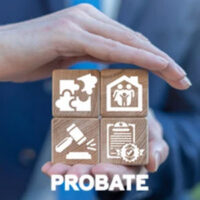What Happens During The Probate Of A Florida Estate?

You may have heard the word “probate” used by estate planning lawyers without actually knowing what it means. In simple terms, probate is a court-supervised process for gathering and distributing the assets of a deceased individual. Put another way, probate is the administration of a person’s estate.
The Goals of Probate
Probate actually has several purposes:
- identifying probate assets;
- paying any lawful debts owed by the deceased at the time of their death;
- paying any additional expenses related to the administration of the estate, including court costs; and
- distributing the remaining assets, if any, in accordance with the law.
The distribution of a probate estate is either testate (the deceased left a valid will) or intestate (there is no valid will). In a testate estate, the will determines the ultimate beneficiaries. In an intestate estate, Florida law specifies the persons who will inherit.
Formal vs. Summary Administration
Florida law also divides probate into two types of proceedings: formal administration and summary administration. Formal administration is what we normally think of as probate. A judge will appoint a personal representative (executor) to oversee the estate, pay creditors and administrative expenses, and file certain reports with the court. Summary administration, in contrast, is a simplified process available to small estates, typically those with less than $75,000 in assets or situations where the deceased has been dead for more than two years. With summary administration, there is no need for a personal representative and the estate is subject to immediate distribution.
Formal administration can actually take several months, and in some cases years, to complete. There are a number of tasks that can drag out a probate proceeding, such as the need to file tax returns, deal with potential creditors, and administering certain complex assets. In some probate estates, it can also take a good deal of time to identify and locate the beneficiaries of the estate. There may also be competing claims or even potential contests to a will, if one was found.
Not All Assets Are Subject to Probate
There are many people who pass away leaving substantial assets but little or no probate estate. The reason for this is there are many assets that are simply not considered part of a person’s probate estate. Some examples of non-probate assets include:
- any asset transferred to a trust during the deceased person’s lifetime;
- assets that are jointly titled with another person, such as a home co-owned by a married couple;
- assets that name a “payable on death” beneficiary, such as a retirement account; or
- a life insurance policy that names a beneficiary other than the insured person’s estate.
There is often a good deal of confusion surrounding the status of certain assets and the status of a probate estate. So if you are involved in a legal matter regarding a loved one’s estate and need advice from a qualified Brandenton wills and probate lawyer, contact Suncoast Civil Law today to schedule a consultation.
